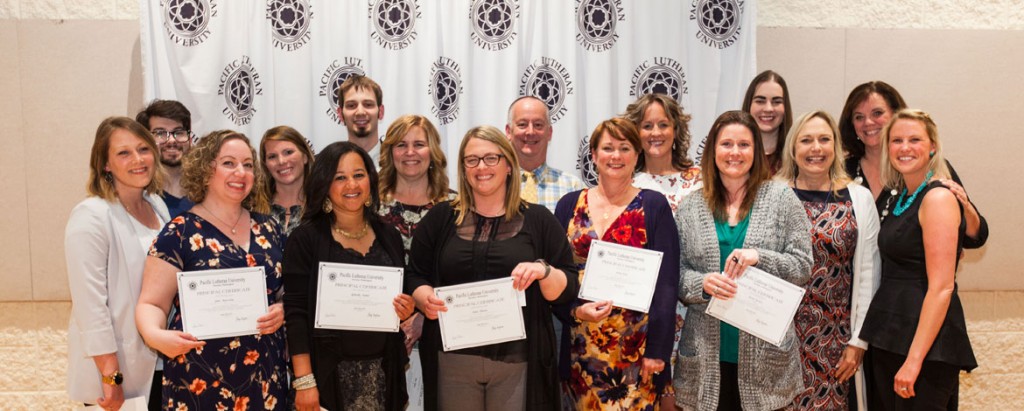Page 53 • (699 results in 0.078 seconds)
-
practicum sequence, so that our students can integrate it with ALL their clients across all their theory classes, and discuss their developing therapeutic rapport during their practicum sequence.”Dr. Elisabeth Esmiol Wilson discusses using iPads to create a culture of feedback in the Marriage and Family Therapy program at PLU.What related tool or strategy do you use that other PLU faculty might like to try in their courses?“The strategy of intentionally creating a culture of feedback in which mistakes
-

simultaneous internship that allows them to work with a mentor principal and put theory into practice. Karra Lantz, a veteran educator with more than 20 years of experience, worked as a counselor at Purdy Elementary School in the Peninsula School District while serving as an administrative intern at the same school. The PLU program positioned her to return to Purdy as assistant principal. "Teachers in the classroom are the most important people in a school. But those people won’t stay at a school if
-
, and social sciences regardless of their major. What don't law schools want you to take? Law schools don’t necessarily like students whose undergraduate curriculums focus on learning the law. The purpose of law school is to learn the theory and practice of law, so the schools do not expect you to already know the material before you arrive. Thus, you do not need to take every class with “law” in the title. If a class seems interesting, then you should take it to learn the content but not to
-
errors. Prerequisite: CSCI 270 or consent of instructor. (4) CSCI 330 : Introduction to Artificial Intelligence An introduction to the field of Artificial Intelligence (AI), the theory and practice behind the development of software systems that perform tasks that normally require human intelligence. Covers effective AI techniques (e.g. neural networks, support vector machine, clustering), usage of machine learning tools, and their application to solve programs in different fields (e.g. business
-
) Any 300-level course with an LT designation ENGL 400: Studies in Criticism & Theory HIST 254: History of Hanford HIST 305: Slavery in the Americas HIST 346: Innovation & Technology HIST 351: History of the West and Northwest HIST 362: Christians in Nazi Germany RELI 211: Religion and Literature of the Hebrew Bible RELI 220: Early Christianity RELI 221: Medieval Christianity RELI 331: New Testament Studies Pre-Law Advising For information, see Pre-Professional Programs section of the catalog Minor
-
listed below are not used in calculating grade point averages. No grade points are earned under these designations. Grade Description Credit Awarded P Pass Yes F Fail No I Incomplete No IP In Progress No AU Audit No W Withdrawal No WM Medical Withdrawal No NG No Grade Submitted No Pass (P) and Fail (F) grades are awarded to students who select the pass/fail option or who are enrolled in exclusive pass/fail courses. These grades do not affect a student’s grade point average. Pass/Fail Option The pass
-
300 : Living Stories A gateway course for the intermediate-level courses in each of the English major concentrations, focusing on the imaginative, critical, and social power of reading and writing. Students will read and write in a variety of genres, engage criticism and theory, and reflect on the broad question of why reading and writing matter, with a special focus on storytelling. Required for all English majors before taking senior seminar ENGL 424 or 434. Strongly recommended for sophomore or
-

amazing things working at the UN or state department or going on to graduate school in the United States and abroad but also sometimes working here in the United States thinking about how social justice issues at home or issues of international relations and international business affect. What’s happening around the world. (buzzer blares) [video: Dr. Shah celebrates, pumping a fist in the air.] Dr. Shah: We did it! Yes! Go team. Meet the Professors More Stories Visit About PLU’s Global Studies Program
-

infection rates in the neonatal intensive care unit of the country’s largest hospital, Windhoek Central Hospital. And while the research isn’t directly tied to neurosurgery, her work in this area has the potential to affect multiple aspects of the medical field. “I’ve narrowed my research down to whether hand hygiene and infection control interventions reduce hospital-associated central line infections,” Larios says. “There’s only been three studies done on this subject, and none were in Namibia.” She
-
comprehensiveness of our platform. The website also includes a collection of resources, aimed at educating the general public on the systemic issues that disproportionately affect marginalized groups in the US. These resources also provide victims of hate crimes with essential information on seeking help and connecting with others who have experienced similar trauma. The platform is created using HTML, CSS, Javascript, and Firebase, while the maps use APIs from Mapbox and Geoapify, in conjunction with
Do you have any feedback for us? If so, feel free to use our Feedback Form.


